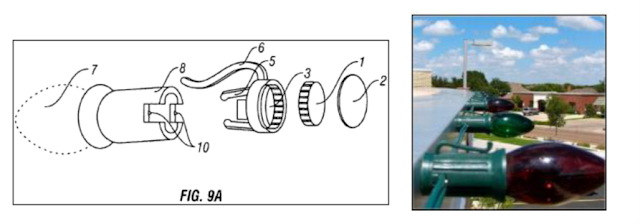Lite-Netics, LLC v. Nu Tsai Capital LLC, NO. 8:22CV314, 2022 WL 15523245 (D. Neb. Oct. 27, 2022)
A rare tortious interference/business defamation case that
results in a preliminary injunction (converted from a TRO), based on claims of
patent infringement made to plaintiff’s customers.
The parties sell “magnetic light strands used to illuminate
homes and businesses during the holidays” and related products, such as
magnetic clips that convert plastic light sockets to magnetic ones.
 |
| one relevant patent diagram and photo from opinion |
Lite-Netics sued defendant HBL for direct and contributory patent infringement; HBL counterclaimed for Lanham Act false advertising and state unfair competition/deceptive trade practrices, as well as tortious interference with business relations and prospective business relations and defamation and “bad faith patent infringement communications under Colorado law.”
Only tortious interference and defamation were at issue
here, based on Lite-Netics’ accusations of HBL’s misconduct. HBL argued that,
based on the parties’ communications, Lite-Netics should have known early on
that there was no infringement (consistent with the analysis performed by the
district court, which also found that the accused designs didn’t infringe).
Despite that, Lite-Netics’s counsel sent several letters to
HBL’s clients and customers “alerting” them of activities allegedly infringing
Lite-Netics’s patents, though Lite-Netics argued that it was contacting its own
customers “after its customers asked how HBL could sell the same product as
Lite-Netics’s patented product.” Although early letters didn’t name HBL, after
Lite-Netics sued, its communications to HBL’s clients and customers accused HBL
by name of infringing the its patents and threatened to sue HBL resellers; Lite-Netics
contended that it was contacting its own top customers to notify them that it
had taken action to protect its rights and that it was unaware of any business
relationship they might have had with HBL, though it didn’t have exclusivity
agreements with the customers.
Tortious interference in Nebraska (as elsewhere) requires
(1) the existence of a valid business relationship or expectancy, (2) knowledge
by the interferer of the relationship or expectancy, (3) an unjustified
intentional act of interference on the part of the interferer, (4) proof that
the interference caused the harm sustained, and (5) damage to the party whose
relationship or expectancy was disrupted.
“State tort claims based on enforcing a patent, including
for tortious interference, are preempted by federal patent laws, unless the
claimant can show that the patent holder acted in bad faith.” This requires
that infringement claims be objectively baseless. The court found this standard
satisfied given the prior art and the differences between HBL’s products and the
patents.
Lite-Netics’ knowledge of HBL’s business relationships could
be inferred from the lack of exclusivity in its relationships with its own
customers, and the fact that “one does not ordinarily threaten one’s own
customers with a lawsuit,” as its communications seemed to do. The court also
found Lite-Netics’s assertions that it did not know these companies were HBL’s
customers to be “rather disingenuous when retailers routinely offer similar
products from various vendors. Also, all Lite-Netics would have to do to
ascertain whether one of its customers was also selling products from another
vendor is check the retailer’s website or walk into its store.”
The accusations caused HBL difficulty with its customers. The
threats to sue customers were also, separately, improper because the
infringement allegations were objectively baseless.
Similar logic led to HBL’s likely success on the merits of
its defamation claim. The litigation privilege did not extend to making baseless
claims about infringement. Baseless claims, which the court thought Lite-Netics
should have known to be baseless, were in bad faith.
Lost reputation and goodwill also constituted irreparable
harm, and HBL didn’t unduly delay—it sought relief in the same month in which
Lite-Netics accused it by name; the earlier communications didn’t name it, and
the parties were also at that time still in direct communication with each
other “apparently pursuing negotiations, even if without much hope of success.”
The injury was also not merely speculative, given an
affidavit that worried customers have called asking whether HBL will be able to
meet supply commitments for the accused products and how the litigation would
affect their orders and shipments, and given that HBL’s accused product was
also patented and entitled to its own protection. In addition, “the timing of
Lite-Netics’s communications to HBL’s customers at the height of the sales
season for retailers to be purchasing stocks of holiday lights is reasonably
likely to exacerbate the impact on HBL’s reputation and goodwill, as customers
may reasonably be expected to choose a different vendor if they have questions
about HBL’s ability to perform and if they are unaware that Lite-Netics’s
threat to add them to this lawsuit is an empty one under the applicable law.”
The court also pointed to a declaration from an Ace Hardware store manager
which explained “the impact of Lite-Netics’s communications to customers on his
own business decisions and the concerns about the impact of those
communications on his own customers,” and also that “these concerns on his part
were alleviated by the Court’s entry of a TRO.” This was more than mere
speculation.
With that out of the way, the balance of equities and the
public interest also favored a preliminary injunction.
Lite-Netics was restrained from making statements “suggesting
‘copying’ by HBL, suggesting HBL customers will be burdened as additional
defendants in this or any lawsuit, or suggesting that HBL is a patent
infringer.” Lite-Netics was ordered to send the court’s order to “all persons
who in the past have received the marketplace communications identified above.”






No comments:
Post a Comment